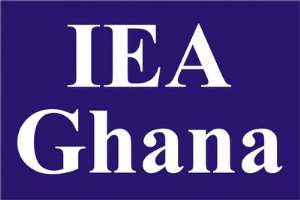
The release of the Institute of Economic Affairs (IEA) governance and socio-economic survey report could not have been released at a more opportune time.
It would seem it was being released to put paid to the unending shadow boxing between government spin doctors and opposition elements over who is getting it right about the quality of governance the governed are receiving from those at the helm.
While members of the opposition continue to point at shortcomings in the management of the public kitty and a debilitating incidence of corruption across the public sector, government maintains a mundane defence of its policies and denying any moral pitfall exists.
The energy crisis in which the country is enmeshed is arguably the most daunting challenge facing government today, continuously teasing its efficiencies at crisis management.
Under the circumstances, only respectable civil society organisations and think tanks with the necessary wherewithal can determine the perception of the people who as the beneficiaries of good governance, or victims of a corruption-studded administration, as the case maybe, are in a better position to state what they see and feel and not what government-resourced spin doctors think and put out.
There is a widespread disenchantment by a cross-section of Ghanaians against the performance of government – its inability to provide electricity and the dwindling purchasing power of the local currency as classic cases of payment of fictitious judgment debts remain outstanding even after court orders that they be retrieved.
Two major demonstrations, so far unequalled in the history of street protests in post-independent Ghana, are but the culmination of a countrywide dissent: both were in protest against the challenging times spawned by bad governance and corruption. Demonstrators in both cases, their huge numbers very critical, are unimpressed with the manner in which the country is being run, their opinions covered by the assortment of placards they bore in both Accra and Kumasi.
The IEA survey's pointer at the presidency scoring the second most corrupt department in the country is not only worrying but eye-opening.
It behoves the government to press the button for a game changer. The government, there is no doubt, would live in denial of the reality and therefore nowhere near addressing the shortcoming.
Unfortunately, and characteristic of the NDC government, the IEA which should be congratulated on a job well done for presenting a picture of what Ghanaians think about it (the government) so the necessary adjustments can be made is at the receiving end of uncharitable expressions intended to rob it (IEA) of deference.
For a think tank which has reached a notch others in its category seek to attain, such vitriolic emanating from a government noted for such reaction when confronted with the reality of underperformance and corruption should mean nothing.




 Lay KPMG audit report on SML-GRA contract before Parliament – Isaac Adongo tells...
Lay KPMG audit report on SML-GRA contract before Parliament – Isaac Adongo tells...
 Supervisor remanded for stabbing businessman with broken bottle and screwdriver
Supervisor remanded for stabbing businessman with broken bottle and screwdriver
 NDC watching EC and NPP closely on Returning Officer recruitment — Omane Boamah
NDC watching EC and NPP closely on Returning Officer recruitment — Omane Boamah
 Your decision to contest for president again is pathetic – Annoh-Dompreh blasts ...
Your decision to contest for president again is pathetic – Annoh-Dompreh blasts ...
 Election 2024: Security agencies ready to keep peace and secure the country — IG...
Election 2024: Security agencies ready to keep peace and secure the country — IG...
 People no longer place value in public basic schools; new uniforms, painting wil...
People no longer place value in public basic schools; new uniforms, painting wil...
 'Comedian' Paul Adom Otchere needs help – Sulemana Braimah
'Comedian' Paul Adom Otchere needs help – Sulemana Braimah
 Ejisu by-election: Only 33% of voters can be swayed by inducement — Global InfoA...
Ejisu by-election: Only 33% of voters can be swayed by inducement — Global InfoA...
 Minority will expose the beneficial owners of SML, recover funds paid to company...
Minority will expose the beneficial owners of SML, recover funds paid to company...
 Prof. Opoku-Agyemang has ‘decapitated’ the NPP’s strategies; don’t take them ser...
Prof. Opoku-Agyemang has ‘decapitated’ the NPP’s strategies; don’t take them ser...
